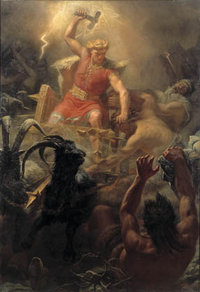Germanic mythology
|
|

Germanic mythology is a comprehensive term for Norse mythology, Anglo-Saxon mythology and other versions of the mythologies of the Germanic peoples. Since Norse mythology is the best known version of, and a source of knowledge for Germanic mythology, the two terms are usually interchangeable, but are not the same mythology. It is a common misconception. The close similarities in these mythologies are due to their being derived from a common Proto-Germanic mythology, dating roughly to the last few centuries BC, in turn ultimately derived from Indo-European mythology, but also due to the persistent cultural contact between the various tribes and peoples.
Most sources have been lost, and it is only from Iceland that there is a substantial literature. The Frankish emperor Charlemagne is said to have made a substantial collection of Germanic pre-Christian writings, which was deliberately destroyed after his death. Some information is found in the Nibelungenlied, and in Beowulf. Limited information also exists in Germania by the roman Tacitus.
Unfortunately, even less is known about mythology or religion of the East Germanic peoples, separated from the remaining Germanic tribes during the Migration period. Such knowledge would be suited to distinguish Proto-Germanic elements from later developments present in both North and West Germanic.
There are certain differences between the mythology of the North Germanic Scandinavian people as it has come down to us and what is known about the West Germanic mythology:
- In Scandinavia, Frigg and Freya were two different, but clearly related, goddesses, whereas they seem to have been one and the same in the other Germanic mythologies. In Norse mythology there are certain vestiges of an early stage where they were one and the same, e.g. Odr/Odin, their shamanistic skills and Freya/Frigga's infidelity. See Frige.
- In Anglo-Saxon mythology, we find the goddess Eostre who does not appear in Norse mythology.
- In the Merseburger formulae appear a Sinthgunt who is a sister of the sun's (Sol). She is not known by name in Norse mythology, and if she refers to the moon, she is then different from the male moon (Mani) of Scandinavian mythology.
- In the present day Netherlands a pre-Germanic goddess named Nehalennia was worshiped.
See also :
Note: This list needs to be cleaned up. It includes articles on German folklore and Celtic mythology.
- Belenus
- Berchta
- Blockhead Hans
- dwarf
- Erlking
- Frau Welt
- Gingerbread Man
- The Glutton of Rodeneck (Austria)
- Grimm
- How Falkenstein Castle Got Its Name
- Holda
- Krampus
- The Little Gray Man
- Lorelei
- Melusine
- Nibelung
- Nippel
- Nix
- The Pierced Armor of the Castle of Eltz
- Rubezahl
- Saint Boniface
- Salzburger Schiachperchten
- The Silver Fir Cones
- Strohschabe
- Thor's Oak
- Völva
- Walpurgis
- Weisse Frau
- Weyland (Saxon)
- wildeman
- Wodan
da:Nordisk mytologi
de:Germanische Mythologie
eo:Nord-ĝermana mitologio
fr:Mythologie nordique
ja:北欧神話
la:Religio Germanica
ms:Mitos Norse
nl:Noorse mythologie
no:Norrøn mytologi
pl:Mitologia nordycka
sv:Nordisk mytologi
zh:北欧神话
